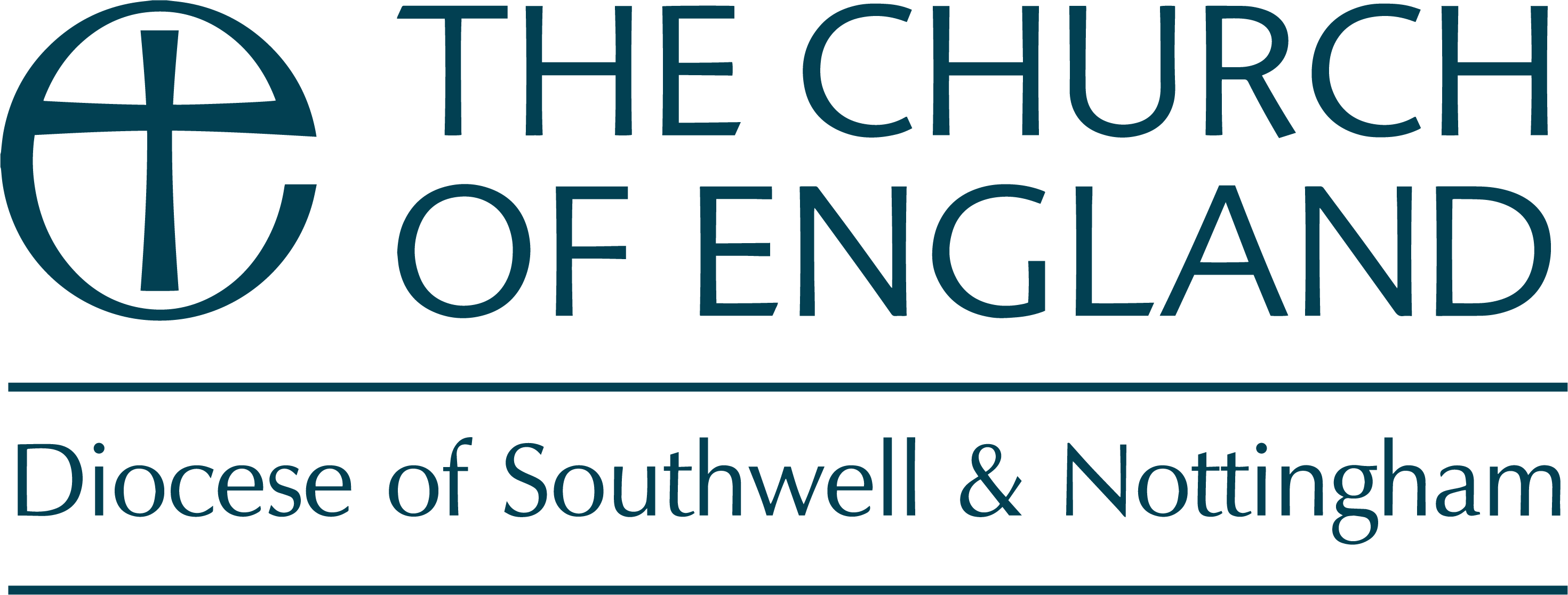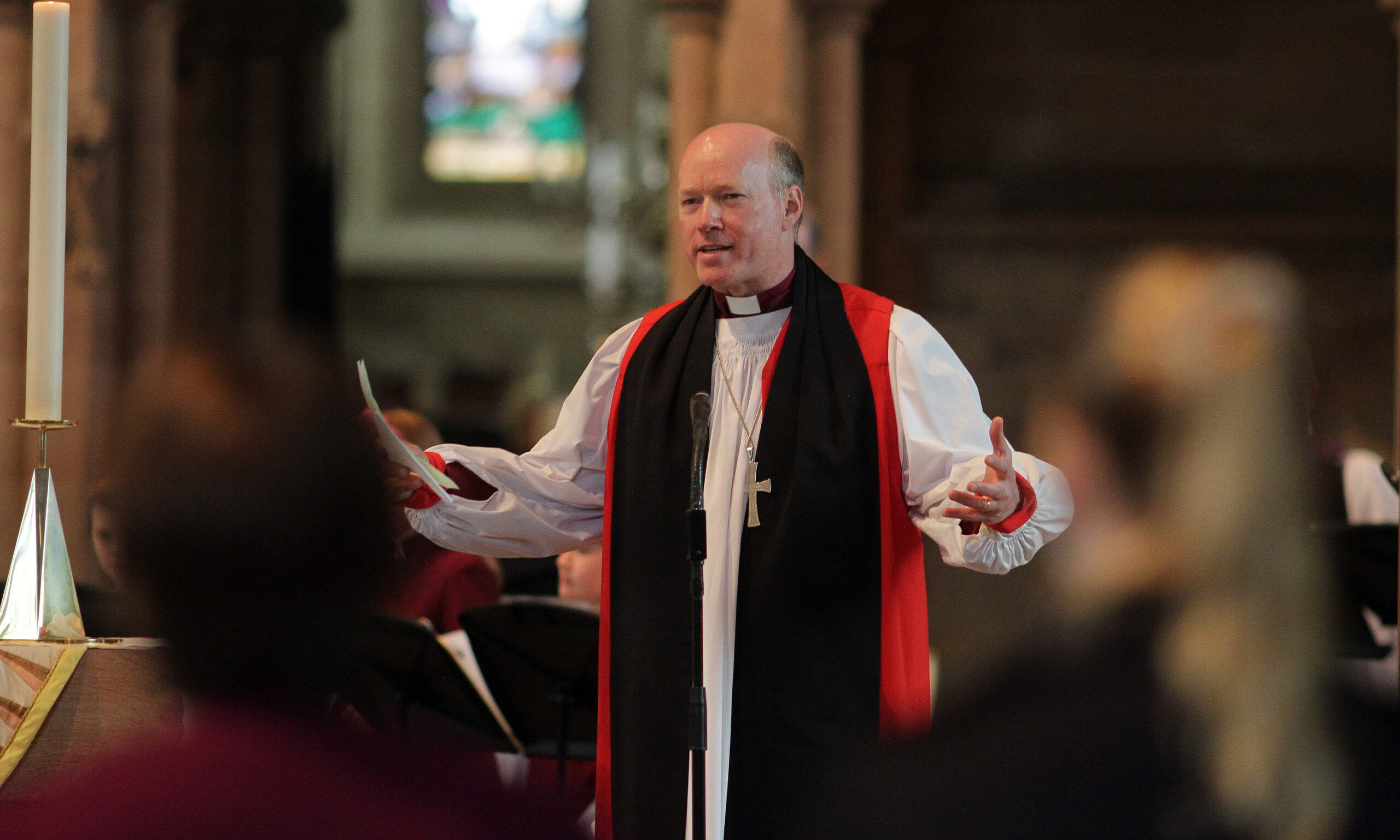Bishop’s Address to Diocesan Synod – Luke 5:1-10
This is the transcript of Bishop Paul’s address to Diocesan Synod on 12th October 2024.
In Luke 5 Jesus begins the task of recruiting a team of people who will serve closely with him in establishing God’s kingdom on earth, and this is the same team that Jesus has called us to be a part of.
In the Church of England calendar, on Thursday we remembered the witness of Saint Paulinus, who in 325 was sent as part of the Gregorian mission to England. Paulinus baptised new believers in the Trent not far from here, soon after the first churches were then planted.
The setting may have changed, two thousand years of history may have come and gone, but this is the same work of Jesus, bringing God’s living hope to every person, everywhere. So in these verses I think we can identify fairly quickly the kind of qualities that Jesus is looking for in someone who would be his disciple – what it means to be a follower after Jesus.
As we take a look at this reading in this first meeting of a new Synod, I want us to notice four discipleship tests that Jesus puts Peter through. And with each one we can consider what it may mean for us personally, in our local church, and especially as a Synod committed to Growing Disciples together.
So, four discipleship tests that Jesus puts Peter through.
For Peter, and any would-be disciple the first test is the READY FOR ACTION TEST.
In Luke 5 we’re told that Jesus has been teaching by the lake in Galilee, and as time goes by an increasingly large crowd has gathered around him. Something needs to be done, and so Jesus climbs into Peter’s boat, apparently without permission, and asks him to row him out a little way so that he can finish his sermon. He’s saying, ‘Peter, I have a problem, and I wonder if you could help me solve it.’ And as soon as he says this he’s reading Peter’s response.
Now a question: Could Jesus have taken one of the smaller boats and rowed himself out a little way? Yes. But Jesus is watching Peter to see what happens when problems and opportunities come his way. Peter didn’t say, ‘Look, I’ve been up all-night fishing can’t you get someone else to solve your problem’, or ‘end your sermon early Jesus, and give us all a break.’
What Jesus is looking for is a person orientated towards action. It’s for this very reason that volume two of Luke’s account of the mission of Jesus will be called the Acts of the Apostles. But for Peter and the others – and for us too – this mission will be in peril if they are relying solely on their actions and efforts, rather than being drawn into the action of Jesus.
We know that Peter was a fairly irrepressible person. He was often the first to express his commitment and roll up his sleeves in order to do whatever it takes to get the job done. He is someone you would certainly want to have on your PCC or any team that wants to make a difference. His passion, dedication and enthusiasm are infectious. But for Peter it won’t be enough for the mission Jesus has in mind, not nearly enough, and that why this first test is closely followed by a second.
The second test that Jesus puts Peter through is the WILL YOU FOLLOW DIRECTION TEST.
This is the authority and submission to Jesus test. Jesus understood the shadow side of action-ready people, and so he gives Peter fishing instructions that fly in the face of his years of experience, and then again he watches his response very carefully. Now I think there’s some code in Peter’s response. He says, ‘Master’, that is, ‘Master, miracle worker, master theologian, teacher…master in a lot of stuff other than fishing’.
‘We’ who’ve been working all night while you’ve been asleep, ‘we’ the professionals, ‘we’ who know that fish don’t hang around in broad daylight waiting to jump into our nets – this is probably some of what is going on in Peter’s mind at this point. But then come six words that will ultimately set Peter apart as a courageous disciple and faithful apostle. The words are there in verse 5, ‘Because you say so, I will’.
Whatever Peter’s attitude at that moment, he did exactly what Jesus asked him to do. He took direction from the Lord of life! It is the same for the church today. Jesus is looking for ‘because you say so, I will’ kind of people to be drawn into his action and build in his kingdom. People who will express strong ideas and opinions – Peter did that too and didn’t always get in right – but people who will finally say, ‘If that is what God says, through his word in Scripture and the prompting of the Holy Spirit, then I will do it’.
Obedience to Christ is the single clearest defining mark of the disciple – and many of us know from painful experience that the cause of disappointment and frustration and angst in the Christian life is the result of our disobedience – our failure to live with Christ as Lord of each moment of each day. Please note this: that the ‘Will you follow direction test’ for a Diocesan Synod is not about blindly following the directions of the bishop anymore than it would mean a congregation following the directions of their vicar. That mindset, however subtle, doesn’t create a healthy church or nurture a safe culture, tragically it has sometimes resulted in terrible harm caused by abusive leadership.
If it is inconsistent or contrary with what Jesus teaches and the Holy Scriptures reveal to us then we should be very wary. Because we are called to be devoted followers of Jesus: it’s his word that counts. Yet sometimes discerning the will of God in a particular area of mission or a changing cultural context will not be without its challenges, requiring time and care, seeking to reach a clear consensus.
This is what our governance structures at every level of the church are there for: not to restrict mission or constrain creativity but to ensure there is clear accountability for those in leadership, and proper processes of discernment in reaching a consensus, especially over things that might otherwise undermine the unity of God’s church in mission.
You may already have detected the relevance of this to the ongoing work around what is known as LLF. If you are new to Synod and not familiar with this, then please do ask and we can sign post you to the key resources. As a Synod we will need to engage in that further work, with a specific opportunity to do so next year. This will be difficult at times, but it really matters to the mission of Jesus we share together.
I know there will be different perspectives amongst us and I suspect some strong disagreement. I want to assure you that what matters most to me is not whether you do or don’t agree with your bishop, but how as disciples of Christ we seek to be obedient to his word, and so pass on the faith to the next generation ‘whole and complete’: it’s a charge that clergy and laity share, but a particular responsibility given to bishops, for which I crave your prayers. Before moving on, it cannot go without saying that all this touches the lives of some people, perhaps many, in a deeply personal way. I therefore pray that God’s love will shine through in how we speak and how care for each other, whatever the eventual outcomes.
Of course, there are many areas of life and mission in which the ‘will you follow direction test’ will need to be carefully discerned, including how the refreshed diocesan vision and strategy remains aligned with the will and work of Jesus. It’s why we should be open to scrutiny at every level in the life of the diocese to ensure that our plans and actions are about fulfilling the commission of Jesus: to announce the gospel, baptise new believers and teach them everything Jesus commanded, also remembering he is with us always.
On to the third test Jesus sets for Peter, and that’s the WHO GETS THE CREDIT TEST.
As soon as Peter gets back to the shore, he falls on his knees and gives credit to the one who deserves credit, because what’s just happened wasn’t about Peter, it was about the power and presence of Jesus. We live in a credit hogging culture and so we need to watch this one so carefully. Heaven watches this one very closely.
Just imagine that Peter had rowed ashore with this phenomenal record-breaking catch and had then jumped out of the boat and ran up and down the beach doing a glory run like he’d just scored the winning goal in a cup final. I think if he’d done that it may have been the last we’d heard about Peter. When things go well, when we lead well, or make a good decision, or serve faithfully, or love deeply, or use our energies and our gifts in some way to advance the work of Christ, then we need to make sure we pass this vital test. Too many good ventures in the Bible and through church history have been destroyed on this one.
Peter’s response to the miraculous catch is that he falls to his knees before Jesus. He knows he is in the presence of the living God and is painfully aware of his frailty and sinfulness. But this isn’t hand-wringing self-loathing, which has very little to do with the gospel, in fact it is usually due to a distortion of the gospel. Instead, Peter is filled with awe and wonder – and his reaction is pure worship, in the presence of the holiness of Jesus, the Saviour of the world.
This is why the focus on inspiring worship is not about having the best services, but coming together to encounter the presence of Jesus, whether the form of worship is traditional or contemporary. The only outcome that really matters is learning to give the glory to God, though he is delighted for us to experience and share in his glory.
Which leads to one further test for Peter and any would-be disciple, and indeed this Synod, and that is THE GRANDER VISION TEST.
And this is perhaps the best part of all, because in verse 10 Jesus says, in effect, if you think that catch was phenomenal Peter, then for a moment, think a far grander thought:
Think about the thrill of seeing the lives of hundreds and thousands of people transformed by God’s love. What about becoming fishers of people?
This is the test that God set for some of us some time ago – when someone tapped us on the shoulder, and pulled us aside; when we were praying on our own, or listening to someone speak. How ever it happened, God set before us a vision of his kingdom that was bigger and grander than any other competing call upon our lives. For some here that compelling sense of call may not have happened yet.
For most it won’t mean leaving their job or engaging in full-time paid ministry, though we are praying that will happen for many more, including among the 27 young people currently serving as interns in the diocese. When it comes to discipleship, God is forming the hearts and minds of people who have the capacity to be gripped by a grander vision – a vision that has to do with his living hope transforming lives and communities everywhere, understanding the eternal significance of what we are called to be and do.
The clarity of this grander vision is what helps the church to endure during times of great suffering, which we pray will be so at this time for the church in Lebanon, Israel and Gaza, and also in Ukraine and Sudan. Our partnership in prayer with them will be a gift to us and perhaps teach us what courage in the faith really looks like. We need that grander gospel vision so we are not overwhelmed by setbacks or disappointments over the next years.
Peter and the others caught that vision, and even though they had very little idea where it would lead them, we’re told they ‘pulled their boat up on the shore, left everything and followed Jesus.’
Four key discipleship tests for every follower of Jesus but perhaps especially at this time for a new Synod:
- Ready for action
- Will you follow direction?
- Who deserves the credit?
- The grander vision
I believe we can be confident that as we look first and only to Jesus, who was crucified and risen for us, that he will lead us and bless us abundantly, whatever the cost of discipleship may mean in the days to come. This is why prayer is the healthiest and holiest way to get in on the action. John Wesley put it very starkly, saying ‘Prayer is where the action is.’ So please make this your highest priority as a member of this synod. We should pray for nothing less than a spiritual revival in our hearts, our homes, in our churches, and touching every community. So, if you can, join us in some way on second Thursdays.
In preparing for today, I sensed God drawing me again to Isaiah 35, and God’s promise to fill the desert places with streams of living water. I want to read this as I conclude this address and invite you to think about the part of the diocese you come from and some of the people and places where you would dearly like God to bring a new blessing through his presence.
“The desert and the parched land will be glad; the wilderness will rejoice and blossom. Like the crocus, it will burst into bloom; it will rejoice greatly and shout for joy…they will see the glory of the Lord, the splendour of our God.
Strengthen the feeble hands, steady the knees that give way; say to those with fearful hearts, ‘Be strong, do not fear: your God will come’…water will gush forth in the wilderness and streams in the desert. The burning sand will become a pool, the thirsty ground bubbling springs…They will enter Zion with singing; everlasting joy will crown their heads. Gladness and joy will overtake them, and sorrow and sighing will fall away.”
You can read a summary from the Diocesan Synod here .



